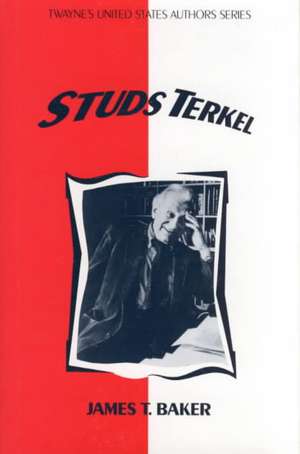United States Authors Series: Studs Terkel: Twayne's United States Authors, cartea 0609
Autor James Bakeren Limba Engleză Hardback – 31 aug 1992
Devoted to critical interpretation and discussion of an author's work, each study takes account of major literary trends and important scholarly contributions and provides new critical insights with an original point of view. An Authors Series volume addresses readers ranging from advanced high school students to university professors. The book suggests to the informed reader new ways of considering a writer's work.
Each volume features:
-- A critical, interpretive study and explication of the author's works
-- A brief biography of the author
-- An accessible chronology outlining the life, the work, and relevant historical context
-- Aids for further study: complete notes and references, a selected annotated bibliography and an index
-- A readable style presented in a manageable length
Din seria Twayne's United States Authors
-
 Preț: 462.02 lei
Preț: 462.02 lei -
 Preț: 462.79 lei
Preț: 462.79 lei -
 Preț: 460.29 lei
Preț: 460.29 lei -
 Preț: 314.33 lei
Preț: 314.33 lei -
 Preț: 464.15 lei
Preț: 464.15 lei -
 Preț: 466.27 lei
Preț: 466.27 lei -
 Preț: 375.22 lei
Preț: 375.22 lei -
 Preț: 464.92 lei
Preț: 464.92 lei -
 Preț: 373.47 lei
Preț: 373.47 lei -
 Preț: 374.45 lei
Preț: 374.45 lei -
 Preț: 461.64 lei
Preț: 461.64 lei -
 Preț: 461.48 lei
Preț: 461.48 lei - 23%
 Preț: 453.23 lei
Preț: 453.23 lei -
 Preț: 464.36 lei
Preț: 464.36 lei -
 Preț: 375.22 lei
Preț: 375.22 lei -
 Preț: 463.93 lei
Preț: 463.93 lei -
 Preț: 372.71 lei
Preț: 372.71 lei -
 Preț: 377.34 lei
Preț: 377.34 lei -
 Preț: 374.84 lei
Preț: 374.84 lei -
 Preț: 373.85 lei
Preț: 373.85 lei -
 Preț: 485.68 lei
Preț: 485.68 lei -
 Preț: 506.67 lei
Preț: 506.67 lei -
 Preț: 375.00 lei
Preț: 375.00 lei -
 Preț: 375.00 lei
Preț: 375.00 lei -
 Preț: 375.98 lei
Preț: 375.98 lei -
 Preț: 462.79 lei
Preț: 462.79 lei -
 Preț: 375.98 lei
Preț: 375.98 lei -
 Preț: 372.93 lei
Preț: 372.93 lei -
 Preț: 378.48 lei
Preț: 378.48 lei -
 Preț: 373.70 lei
Preț: 373.70 lei -
 Preț: 375.39 lei
Preț: 375.39 lei -
 Preț: 463.77 lei
Preț: 463.77 lei -
 Preț: 300.84 lei
Preț: 300.84 lei -
 Preț: 374.45 lei
Preț: 374.45 lei -
 Preț: 486.66 lei
Preț: 486.66 lei -
 Preț: 373.47 lei
Preț: 373.47 lei -
 Preț: 374.07 lei
Preț: 374.07 lei -
 Preț: 467.42 lei
Preț: 467.42 lei -
 Preț: 376.95 lei
Preț: 376.95 lei -
 Preț: 373.85 lei
Preț: 373.85 lei -
 Preț: 374.07 lei
Preț: 374.07 lei -
 Preț: 485.51 lei
Preț: 485.51 lei -
 Preț: 376.95 lei
Preț: 376.95 lei -
 Preț: 373.47 lei
Preț: 373.47 lei -
 Preț: 483.60 lei
Preț: 483.60 lei -
 Preț: 485.51 lei
Preț: 485.51 lei -
 Preț: 487.42 lei
Preț: 487.42 lei -
 Preț: 487.04 lei
Preț: 487.04 lei
Preț: 465.13 lei
Nou
89.00€ • 92.74$ • 73.69£
Carte indisponibilă temporar
Specificații
ISBN-10: 0805776389
Pagini: 194
Dimensiuni: 147 x 225 x 20 mm
Greutate: 0.4 kg
Ediția:New.
Editura: Twayne Publishers
Seria Twayne's United States Authors
